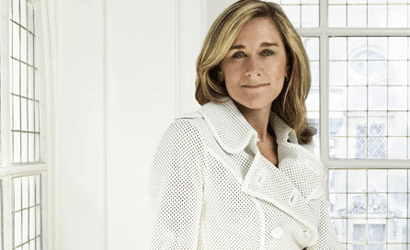Navigating brands through turbulent times
 Schranz keynote speaker, Lisa Baird, the chief marketing officer of the United States Olympic Committee spoke at Ball State on how to guide a brand through difficult times.
Schranz keynote speaker, Lisa Baird, the chief marketing officer of the United States Olympic Committee spoke at Ball State on how to guide a brand through difficult times.
Brands determine what a company or organization does, how they do it and when they do it. That being said, a company’s brand can either make or break their business. Baird spoke to Ball State University students, faculty, staff and community members, on November 3, 2010, about how learning to make a brand flexible and adaptable is a key factor in the success of any business.
Baird has previously worked for the NFL as the senior vice president of marketing and consumer products, as well as for IBM, General Motors and Proctor and Gamble.
As part of her current job Baird directs and oversees development of marketing while leveraging the unique aspects of the Olympic brand.
Baird said she was happy to be able to come to Ball State to lecture because, “A lectureship allows students to hear from diverse groups of leaders in an industry undergoing change, we’re living in interesting times, it’s hard to keep up when brand information flows so fast.”
“I’ve helped shape some of the world’s best brands and have developed a personal compass that helps guide my work that I’d like to share,” Baird said.
Baird believes that Facebook, Twitter and other social media platforms allow brands to create personal value and foster interactions.
“We’re all connected as a global community and technological changes can be a major disruptive force to brands if not handled right,” Baird stated.
Baird asked the audience to consider how technology has changed brands in drastic ways in less than a decade.
“There’s been a shift in who consumers look to for information, new technologies have given them new options,” she said.
Baird believes that her compass can be used to help brands navigate through the turbulent times technology has thrown at them. Her compass has four points to help guide companies with brand development and changes.
The first point is start with a purpose.
“It all starts with a brand defining its purpose, you have to define how the brand touches lives, you need to define the soul of the brand,” Baird stated.
Defining a purpose leads top focused and driven marketing and public relations efforts and helps companies avoid trend following. Baird also discussed the importance of making the company’s employees its brand ambassadors, as the Olympic committee has done with its athletes.
“The second point on the compass is control, meaning how well you monitor and influence control of information to build your brand,” she stated.
According to Baird, control needs to be monitored throughout the process of building a cultivating a company’s brand because of brand sentiment, how people feel about a brand can change quickly and create turmoil.
The third point on the compass is evangelism.
“A chief brand evangelist guides the brand decisions and presides over growth in the brand, they have a vision that guides every decision,” Baird said.
In her opinion, a brand evangelist can influence decisions in sales, governmental relations public affairs and any other area the company may be affected by or targeting.
“A chief marketing officer for a company has to instill brand ambassador qualities in its employees and usually reports to directors now, so everyone is on the same page,” Baird said.
The fourth and final point on Baird’s compass is authenticity.
“The most important value consumers are looking for and missing in conversations is authenticity, and it needs to be actively practiced, consumers and media demand credibility,” she said.
Baird also spoke of how important authenticity is in times of a crisis.
“I think the world today operates under a construction sign…uncertainty lies ahead…media, stakeholders, etc. are armed with weapons of mass communication,” Baird stated.
“Companies and organizations need to be guided by a strong sense of purpose, they need to shape the conversation to help manage their brands in these turbulent times,” Baird said.
She has hope for the future though, “I believe that marketing and PR professionals are ready to take on the world and help their brands survive.”



